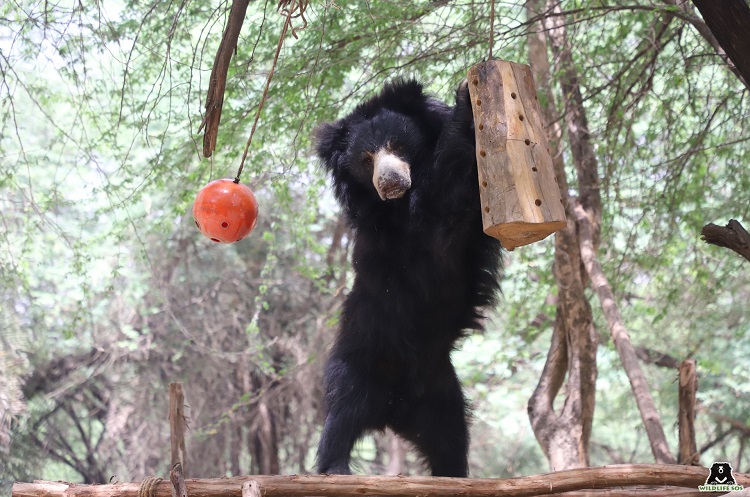The Agra Bear Rescue Facility (ABRF), established in 1999 by Wildlife SOS in collaboration with the Uttar Pradesh Forest Department, stands as a ray of hope for sloth bears in need and serves as an example of responsible eco-tourism. As the largest sloth bear rescue centre in the world, ABRF provides refuge for over 100 bears who have experienced sufferings.
The bears that find solace within the confines of ABRF have faced immense physical and psychological trauma. At the centre, each rescued bear undergoes a 90-day quarantine period during which they are given a complete health checkup and treated for any diseases, wounds and parasites. The bear is vaccinated against rabies, leptospirosis and infectious canine hepatitis. After the quarantine period, the bears have access to large socialisation enclosures where the behaviour and personality of each bear is closely monitored by the Wildlife SOS veterinarians & staff. The enclosures ensure bears interact with each other. Based on each bear’s personality, they are matched to a group and then moved to a larger free-range area.
Once the quarantine period concludes, the bears are transferred to large socialization enclosures. Wildlife SOS has full-time wildlife veterinary doctors and a dedicated team of caregivers to look after the rescued bears. ABRF undertakes advanced research, disease management and provides specialised veterinary care as well as geriatric care to the bears. The bear hospital is equipped with a path-lab in addition to essential equipment like thermal imaging camera, digital X-ray, ultrasound, dental suite, operation theatre and other equipment needed to meet any bear care need that may arise.
ABRF welcomes volunteers who wish to directly contribute to the well-being of the rescued animals. By assisting expert team members such as veterinary officers and caregivers, volunteers gain a deeper understanding of the challenges faced by these bears. Engaging in activities such as enrichment building, cleaning enclosures, and maintenance not only supports the facility’s operations but also fosters a greater appreciation for wildlife conservation.
In addition to their work with sloth bears, Wildlife SOS is actively involved in raising awareness about the cruelty and exploitation associated with elephant rides. Elephant rides are unfortunately a tourist activity across south-east Asia which promotes animal cruelty and exploitation. While riding an elephant’s back might come across as a fun activity, what most tourists and travellers are unaware of is that these elephants go through horrific training methods in order to be ‘tamed’. Repeated thrashings, starvation, prodding of bullhooks, heavy chains restricting their movement and the unending psychological abuse that an elephant undergoes are just the first step of a lifetime of cruelty and neglect. The only way to train an elephant to enable tourist rides is through keeping the elephant in constant pain and fear. Elephant calves are poached from the wild, tearing them away from their mother and herd, kept in isolation and mercilessly beaten until they become submissive, fearing the pain that their master is capable of inflicting upon them. This cruel practice is called phajaan, or “breaking of the spirit.” After they are deemed “tame” enough to do what people tell them, these elephants are sentenced to a lifetime of misery and torture giving joyrides to tourists.
To combat this cruel industry, and educate people about elephant riding, in 2018, Wildlife SOS launched a campaign called Refuse to Ride. We are optimistic that the RefuseToRide campaign will help bring a change for the elephants and all around the country. Individuals can help make a difference and sign the petition here: http://www.refusetoride.org/
 TravTalk India Online Magazine
TravTalk India Online Magazine





